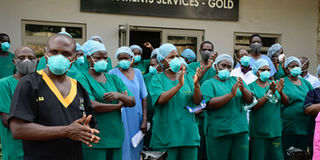Scientists reject Mulago calls to lift lockdown

Mulago hospital health workers led by the executive director, Dr Baterana Byarugaba (left ), during the discharge of a recovered Covid-19 patients in March. PHOTO / FILE
What you need to know:
Dr Wayengera said the Covid-19 National Task Force has engaged even the Inter-Religious Council of Uganda to come up with SOPs for operations, “whose feasibility will duly be evaluated.”
Scientists have rejected calls by Mulago hospital officials for the government to release sectors under lockdown.
On Tuesday, Dr Baterana Byarugaba, the hospital executive director, and Dr Fred Nakwagala, the head of the hospital’s Covid-19 management unit, asked the government to release people from lockdown, saying the type of coronavirus in the country is mild and cases can be managed from home.
The scientists, however, say they are not naïve in their advice that the country follows a step-wise approach to release people from lockdown, adding that releasing people in a disorganised manner will render useless the very basis for which the lockdown was instituted.
Dr Misaki Wayengera, the head of the ministerial scientific advisory committee on Covid-19, in a letter to Daily Monitor yesterday, said remarks by Mulago officials showed a lack of understanding.
“…one must understand the trajectory of the epidemic in Uganda to know what is taking place. All across the world, severe cases of Covid-19 were never experienced early in the pandemic. It took the establishment of community transmission and penetration of the disease to pockets of vulnerable populations that deaths started to happen,” he wrote.
“It is, therefore, sad that even our own senior colleagues have fallen for the ambiguity that the pandemic presents in its early phases. It is a factor of time and as we see cases rise and establishment of community transmission, we certainly will start to see severe cases following penetration of the disease to vulnerable populations,” Dr Wayengera added.
He revealed that the lifting of the first lockdown started a month ago and the phased approach implies that some sectors deemed high risk have not opened.
“Most of the yet-to-be opened sectors have, however, been guided on SOPs to follow for opening, except that for some sectors such as education, the ability to successfully implement the same SOPs has become a matter of controversy among key stakeholders-teachers, parents, students and school owners,” Dr Wayengera said.
So far saloons, arcades, boda bodas, schools and churches have remained under lockdown.
Govt efforts
But Dr Wayengera said the Covid-19 National Task Force has engaged even the Inter-Religious Council of Uganda to come up with SOPs for operations, “whose feasibility will duly be evaluated.”
He said the same applies to boda boda cyclists and saloon operators.
Arcades that have successfully been validated for compliance to SOPs are due to open by Friday. A genomic analysis conducted by the Uganda Virus Research Institute (UVRI) has revealed that the strain of the virus in the country is the same as that in the United Kingdom, Middle East and United States of America.
“The early and active case finding instituted by Uganda at its border points of entry, meant that mainly young players with less comorbidities were captured. Thus, the dancing and partying patients in hospital,” Dr Wayengera said.
Expert advice
Dr Andrew Kambugu, the executive director of Infectious Diseases Institute (IDI) of Makerere University, said it is important that the country follows a step-wise approach to release people from lockdown. “The country needs to take data-driven approaches as they ease the lockdown. Are they monitoring what is happening to the new infections? One of the conditions for easing the lockdown is to monitor what is happening,” he said.
Eight news cases reported
Meanwhile, the Ministry of Health has reported eight new Covid-19 infections as the number of confirmed cases on Thursday rose to 1,051.
The director general Health Services, Dr Henry Mwebesa on Thursday said two of the new cases are alerts from Kampala while five are contacts of people who tested positive for the virus in Amuru and Lamwo districts.
“Ten foreign truck drivers (8 Kenyans and two Tanzanians) tested positive for the virus at the border points of entry and their entry into the country was not permitted,” Dr Mwebesa said in a statement issued Thursday.
He further observed that the number of people who had recovered from the virus since March 21 when the first case was confirmed in the country had risen to 1,014.
The number of Ugandans on admission in different health facilities is now at 173 out of the 194 active cases.
So far, the Ministry of Health has tested 235,013 people since the outbreak of the virus was reported.




